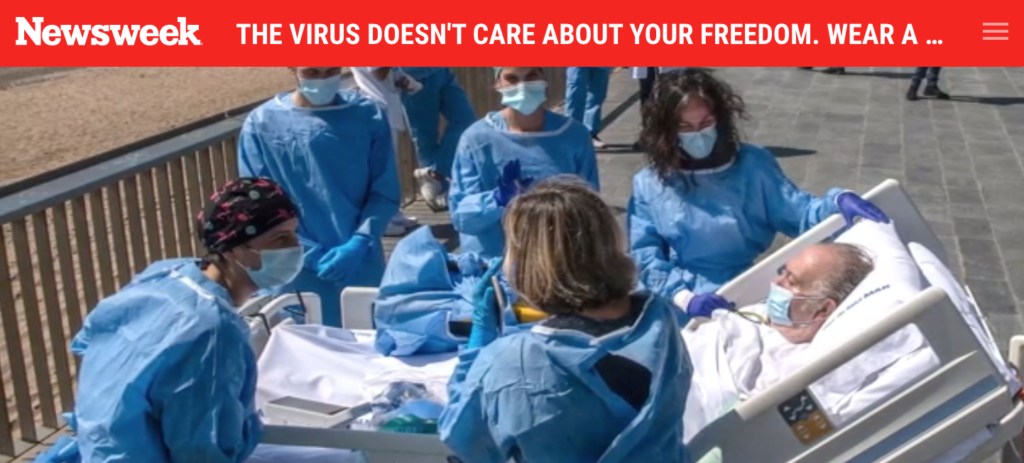This article was originally posted on Newsweek June 17, 2020
“There’s no freedom if you’re dead.” That’s what friends of mine in Asia, particularly Hong Kong, have said when I’ve tried to explain the reluctance some Americans have to wearing masks to help stop the spread of COVID-19.
My family and I spent years living in Asia. My kids were little when we lived in Hong Kong during the SARS outbreak. Through that experience, we learned a whole different way of looking at masks. Now, living in the United States during this new pandemic, it’s clear to me that we would benefit from learning the same thing.
What people there have, and what many people in some other parts of the world do not yet have, is a fundamental focus on masks as something you wear for the benefit of everyone else. Whether or not they’re worried about their own health, people are concerned that they may be carrying the deadly virus (even if they have no symptoms), and they don’t want to infect others.
This instinctive concern was clear among children in school. When kids would cough or begin to feel unwell, they would ask the teacher for a mask in order to avoid getting their classmates sick. During the time that we lived there, my children developed the same habit.
With this way of thinking as the backdrop, seeing someone in a mask anywhere in society didn’t come across as strange or surprising. Instead, it looked good, in its own way. It showed that someone was being considerate, a sign of caring. It showed that many people were willing to put other people’s health first, even if it meant wearing something uncomfortable.
This does not mean that people elsewhere, including in the United States and Canada, don’t care about each other. But when it comes to masks specifically, in Hong Kong this idea of protecting others’ health trounced any suggestion that wearing a mask could be an affront to personal freedom—the kind of thinking that has led to some disturbing incidents.
This cultural mindset has helped Hong Kong control the spread of COVID-19. As of the time of writing, New York City, population of 8.4 million, has had over 17,000 deaths. Hong Kong, population 7.5 million, recorded 4. Not four thousand: four. As Vox explained back in May, “One reason that could help explain the stark disparity: In Hong Kong, nearly everyone wears a face mask in public.” The Atlantic, similarly, noted that “surveys show almost 100 percent voluntary compliance” for mask-wearing in Hong Kong.
Meanwhile, in a U.S. poll in April, respondents were split about equally into three groups, saying they wear masks outside the home always, sometimes, or never. In a different poll in May, however, 84 percent of respondents said they have worn a mask to limit the spread of COVID-19.
Scientists have long warned that pandemics will become more frequent. In the United States, we need to make widespread mask-wearing during a pandemic a cultural norm. The best way to start is by raising the next generation to see it as a good thing to do for others.
Kids have long been taught to use their “cough pocket,” coughing into the inside of their elbow, to prevent spreading their germs. Now, we have the chance to teach kids about wearing masks as the next step.
We can teach them that it’s not just about protecting themselves and their classmates from possible spread of the coronavirus. It’s also, crucially, about protecting their teachers and other school staff.
When a group of researchers from the University of Arizona “studied the desks, computers and phones from various professions, teachers wrecked the curve,” ABC reported. “Teachers had six times more germs in their workspace than accountants, the second-place finisher.”
Education week cites a French study that found teachers are more likely than people in other professions to have health problems related to the ENT tract. And recent research finds that about 29 percent of U.S. public school teachers and 37 percent of private school teachers are age 50 or older—and therefore at elevated risk of severe illness from COVID-19.
With all this in mind, teaching our children the importance of wearing a mask at school is an opportunity to teach altruism. That’s why I decided to be a part of the new SchoolMaskPack program, designed to make the process as easy and enjoyable as possible.
We’re living through very difficult times. To me, making mask-wearing a natural, altruistic act takes on big significance. It’s like a nice vote for humanity.


